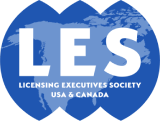The LES Silicon Valley chapter recently brought together a group of panelists for a thought-provoking discussion on opportunities for life sciences and healthcare companies to use and license their internally and externally generated data. This article highlights some of the panel discussions, demonstrating the panelists’ deep knowledge of artificial intelligence (AI) and data science related to healthcare data and addressing many of the complex questions that lawyers and licensing professionals are grappling with.
Cross-industry Interest in the Silicon Valley Chapter
On September 19, 2023, at Morgan Lewis’ Silicon Valley office, industry professionals Douglas Crisman (Partner, Morgan Lewis), Eric Lin (Senior Patent Counsel, Genentech), Duane Valz (Former VP and General Counsel, Insitro, Inc.) and Chitra Kalyanaraman (Moderator, Senior Patent Counsel, Johnson & Johnson) shared their insights on how companies collect, license, and use healthcare and scientific data. This panel focused on the intersection of life sciences and technology, and the event drew in a diverse Bay Area crowd, with over 100 registrants and almost 70 attendees. This meeting underscored the growth of life sciences participation in the Silicon Valley chapter and the opportunities and interest that the SV chapter has in promoting cross-industry events.
What Artificial Intelligence is and How it is Protected
To introduce such a complex topic, Jianbai “Jenn” Wang (Associate, Morgan Lewis) offered an informative introduction to the topic of data, artificial intelligence (AI), and data science and how IP in this space can be protected. Mixing technical knowledge with humor, Ms. Wang discussed how neural networks function, and the potential applications of AI and technologies like ChatGPT in the healthcare industry. While patent protection may be available for aspects of these technologies, other forms of IP protection like copyright, privacy, and contractual provisions are also highly relevant. AI technologies are being hotly debated as we speak, and various legislation relating to AI is proposed or pending in the United States and European Union.
Why Companies Pursue AI and Data Science
Healthcare companies have turned to data science for a variety of purposes. These technologies may be used to optimize drug development pipelines by allowing early identification of promising molecules. Data science is, therefore, highly valuable as a new modality to complement traditional R&D approaches. Data science may also open new focus areas, such as personalized medicine. In addition to enabling discovery, in the case of medical devices, AI and data science may be incorporated in the regulated end product itself.
The Challenge of Collecting “Good” Datasets
The discussion turned to how good AI is built from good data, and therefore, great importance should be given to starting with robust, clean datasets. This begins with a company’s data governance structure and clinical trial data management; it is critical to bring the right subject matter experts into this multi-disciplinary process, from privacy to regulatory compliance to intellectual property. Data may be collected from various sources, including self-collection or licensing from hospitals and industry partners, patient advocacy groups, clinics, etc. Different data may not be useful for all other purposes. Therefore, the focus should be placed on understanding how the data was collected, how it is intended to be used internally and externally, and whether additional action is needed to ensure data consistency and harmonization.
Open Source Licenses and Open Questions
The panelists clearly held expertise in open-source licensing, raising several important points regarding the use of open-source data and open-source computational models. Unfortunately, there are limited court decisions and formal standards in this space, and when using data or software licensed via open source, your team needs to ask complex questions. These inquiries may include whether a use is commercial or not, whether the use is sandboxing or if there will be downstream implications, and whether the relevant licenses impose tricky use restrictions, among other things.
A Lively Discussion
The attending audience was eager to ask hard-hitting questions, and the event included an extended Q&A session. A recurring area of questioning related to specific considerations around patient data, including de-identification and reconstruction of the same. The panelists spoke about how privacy was a complex and significant issue, how it could differ jurisdictionally from country to country, and how limitations could be placed on the import or export of data. Additionally, patient consent forms must be robust enough to preserve the optionality of data use moving forward. Often, data science opportunities may not be identified until years after the clinical data has been collected, and it is important to ensure that the appropriate usage rights are in place to allow forward-looking use. Toward the end of the panel, the attendees also spoke about the potential use of synthetic data (for which “original” patient data cannot be recreated) and how such data is often not addressed in contracts.
Licensing Considerations
The question of whether to license or own data resulting from partnerships is tied to your intended use. If the data is necessary to the core functions of the business, the panelists recommended that ownership of the data, derivative data, and/or other results or intermediate IP may be essential. However, many companies are content not to own such data, provided they have robust usage rights to deploy data science models and keep the generated insights and learnings. This determination is company-specific—the closer the transformed data is to your business, the more incentive there is to maintain ownership of these resources. For more information go to www.les-svc.org.
Photos of September Event
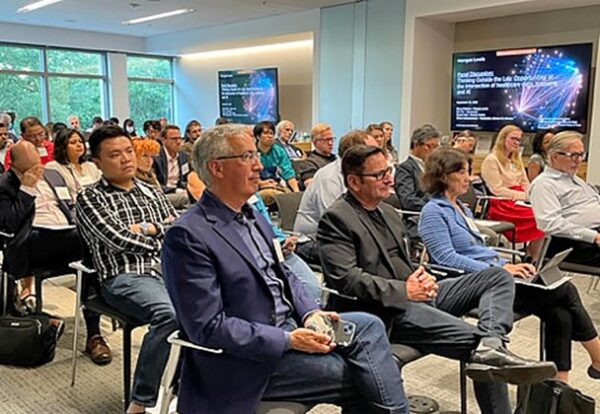
The LES Silicon Valley Chapter’s September 19 event attracted a diverse Bay Area crowd, with over 100 registrants and some 70 attendees. Thank you to Morgan Lewis for graciously hosting the chapter’s program in Palo Alto, followed by a well-attended reception, allowing the attendees and panelists to mix and mingle.
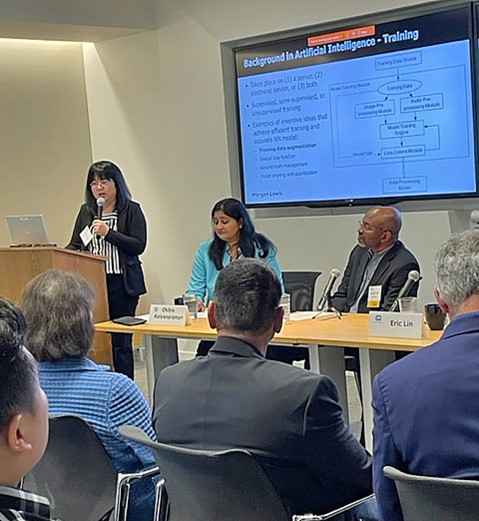
Jianbai “Jenn” Wang (Associate, Morgan Lewis) (at the podium), while mixing technical knowledge with humor, introduced the complex topic of “What Artificial Intelligence is, and how it is Protected” through an informative introduction to artificial intelligence (AI) and data science, and how IP in this space can be protected.
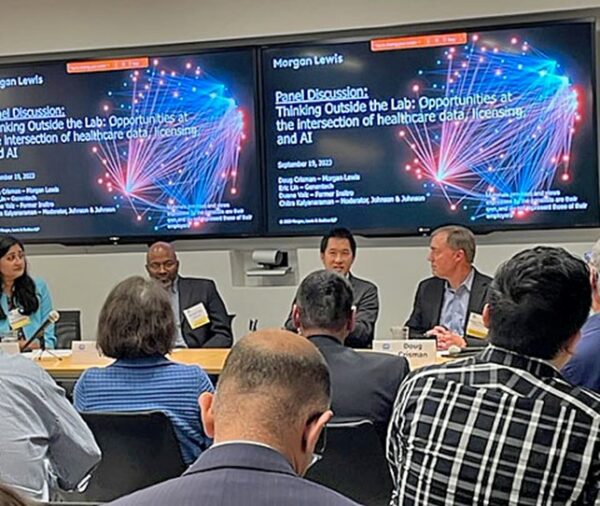
Panelists (left to right) Chitra Kalyanaraman (Moderator, Senior Patent Counsel, Johnson & Johnson), Duane Valz (Former VP and General Counsel, Insitro, Inc.) Eric Lin (Senior Patent Counsel, Genentech) and Douglas Crisman (Partner, Morgan Lewis), while focusing on the intersection of life sciences and technology, shared their insights on how companies collect, license, and use healthcare and scientific data.
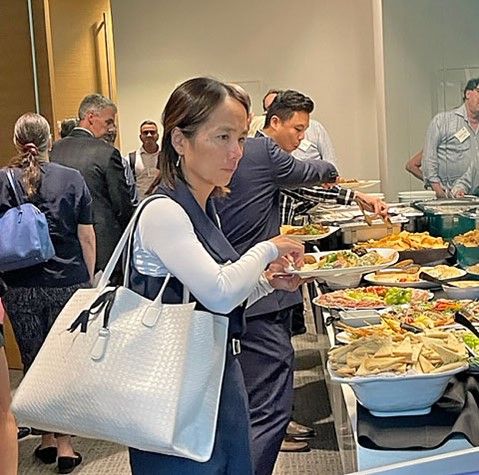
Attendees enjoy a sampling of delicious appetizers and beverages in Morgan Lewis’ reception area.
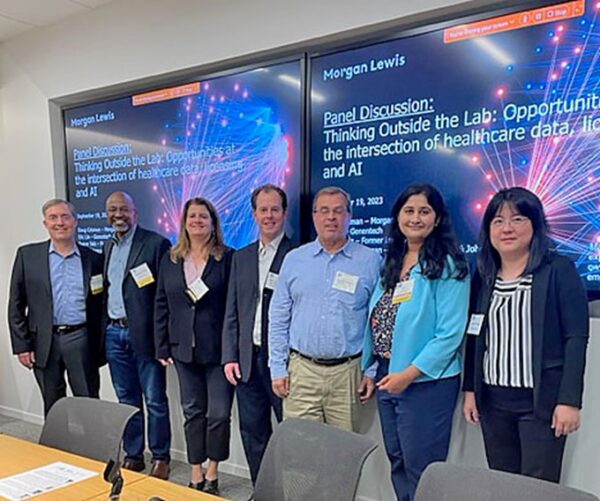
Much appreciation to (left to right) Morgan Lewis and speakers: Douglas Crisman (Partner, Morgan Lewis), Duane Valz (Former VP and General Counsel, Insitro), Efrat Kasznik (LES Silicon Valley Chair, Foresight Valuation Group President and Founder), Ahren Hsu-Hoffman (Of Counsel, Morgan Lewis), Andy Gray (Partner, Morgan Lewis), Chitra Kalyanaraman (Senior Patent Counsel, Johnson & Johnson), and Jenn Wang (Associate, Morgan Lewis). Eric Lin (Senior Patent Counsel, Genentech) Revnot pictured.
